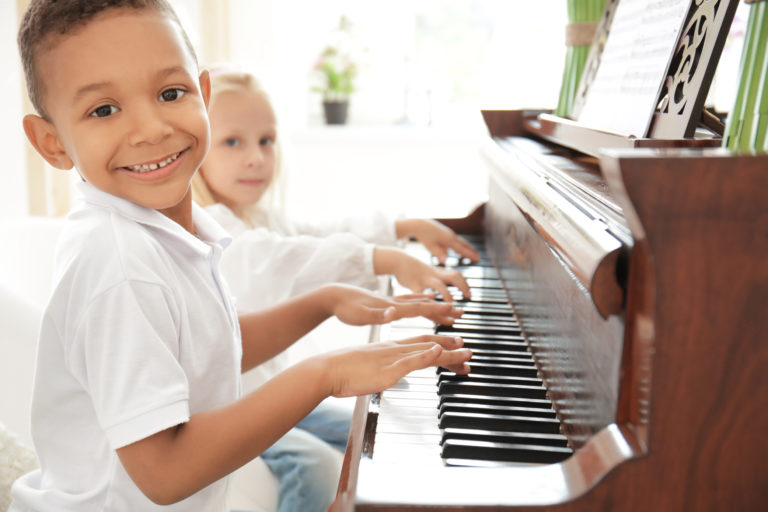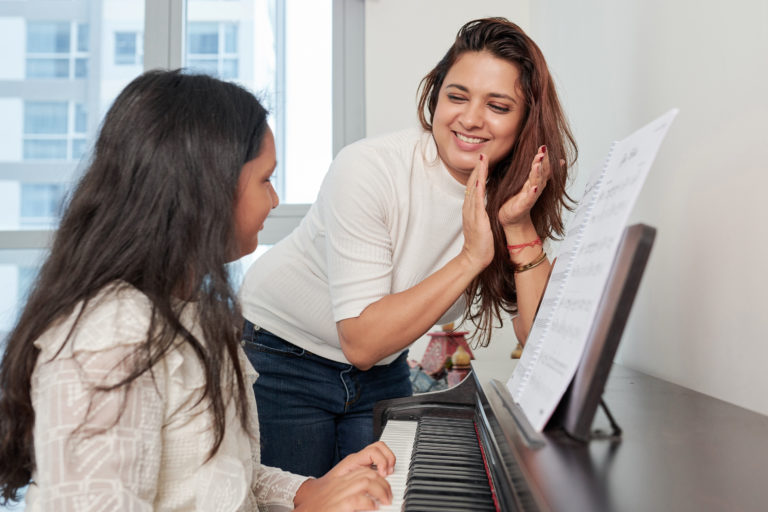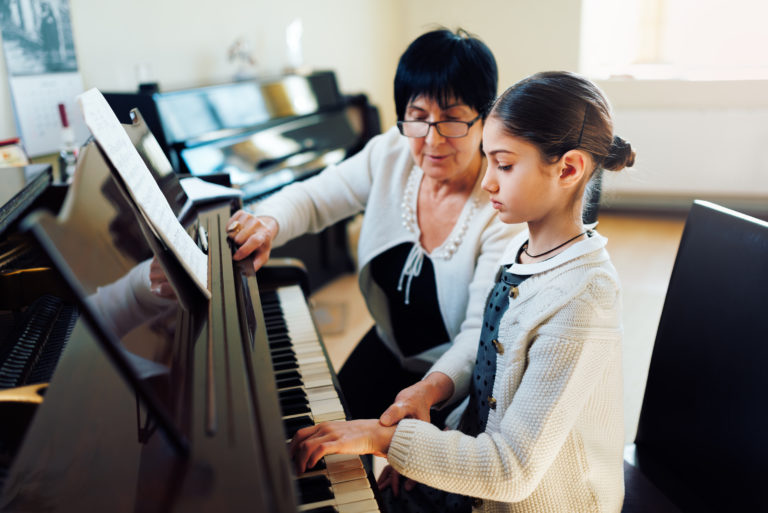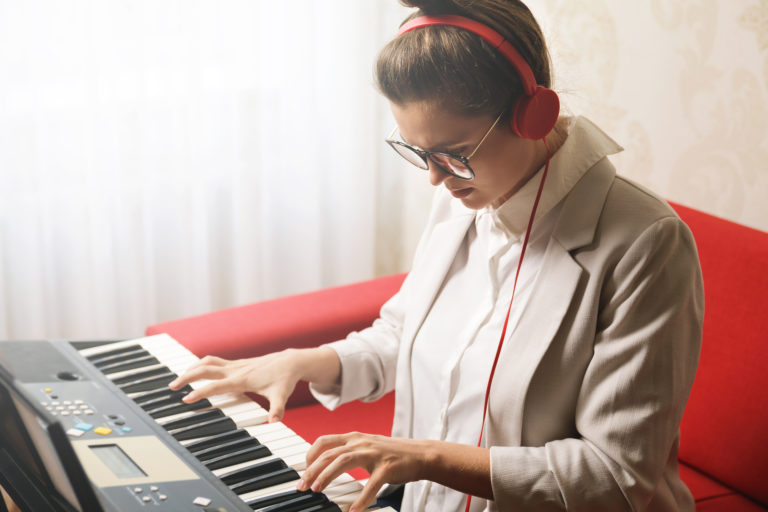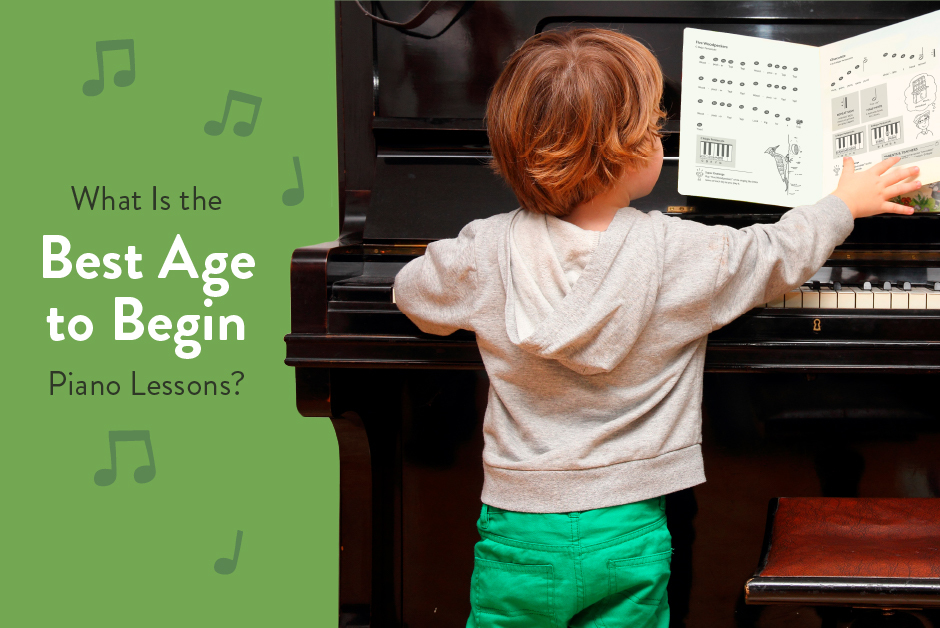Explore our tips for beginning piano lessons below.
Parents who give their children the gift of a musical education start them out on a path that will enrich their lives in so many ways. Studying music develops discipline, hand-eye coordination, intelligence, and creates a skill that can bring happiness to both the performer and to all who listen. According to a recent article in the LA Times, 6-year-olds who received keyboard instruction had more brain growth and better fine motor skills than their peers. You, as a parent, want these benefits for your child, but you might be wondering what age is best for beginning piano lessons.
First of all, let me say that there is no one age that is perfect for all children. You can find examples of children who started piano lessons at three years old, but that is very rare. Other kids beginning piano lessons as late as ten or eleven can also become excellent professional pianists. Those who start later in their teens might not be ready to enter college as a piano major, but they can still get a lot of benefit. Anyone of any age who wants to learn, and puts in the hours of practice, can still reach a high level of skill and enjoyment.
Sign up for a free account now and receive over 300 video lessons (and counting!) accessible on any smart device.
Is It Ever Too Early to Begin Piano Lessons?
It is true that you can find videos on YouTube of three-year-olds playing Mozart, but that doesn’t mean a three-year-old who likes plunking on the piano keys should be signed up to begin piano lessons. Children under the age of five who show an interest in the piano should be allowed to explore and learn on their own time table. They probably won’t respond well to an adult-imposed learning structure. Always active and curious, a toddler might pay attention to an adult who is trying to teach them something for about three minutes, but then they notice something else they want to check out. If you put a child at this age in piano lessons, most of the teacher’s time will be spent in redirecting the child’s attention to the piano. It just isn’t a very effective use of your time and money for beginning piano lessons.
Instead, parents of children under age five should be doing things to cultivate a general interest in music. Singing, dancing, and listening to recorded music are things you can do at home with children at any age. Also, consider enrolling your child in a good preschool music program, like Kindermusik, Music Together, and Musikgarten. These programs build awareness of musical concepts like rhythm and pitch and lay a good foundation for learning a musical instrument.
Subscribe for updates, content & free resources!
The Requirements for Readiness When Beginning Piano Lessons
The best time to start piano lessons will be different for every child, but most will be ready between the ages of five-and-a-half to eight years old. Some five-year-olds might be ready to start, but not always. How do you know if your child is ready? Here is a short checklist to consider before beginning piano lessons:
1. Size of Hand to Begin Piano
Can your child easily place five fingers on five adjacent white keys? For some five-year-olds, that’s a big stretch! Before beginning piano lessons, make sure your child’s hands have grown enough to be comfortable using a keyboard.
2. Finger Independence
If you ask your child to hold their hands up and wiggle, say, only their left-hand ring finger, can they do it? Before beginning piano lessons, children need to be able to move individual fingers. A good test of this is to try Hoffman Academy’s Lesson Number 1, “Hot Cross Buns.” (It’s free!) A child who can use three different fingers on three black keys to play “Hot Cross Buns” is ready for lessons. A child who can only play by picking out the tune with one finger is probably not ready.
You can practice finger independence with your child to help them get ready for beginning piano lessons. Hold up your own hands and have your child copy you as you wiggle only one finger at a time. Watch out, this game can lead to lots of giggles and maybe even some tickling.
3. Interest in Music and Desire to Learn
Probably the most important thing on this checklist is your own child’s desire for beginning piano lessons. If the motivation to learn comes from your child, it will help them overcome all sorts of difficulties they might encounter. If the motivation only comes from you, then sooner or later you’ll end up with a power struggle.
When my three-year-old son saw me teaching piano in our home he wanted to begin piano lessons too. After my regular students were gone for the day, I’d give him a pretend piano lesson. Most of the time we sang a song together while he smashed keys on the piano. When he turned five I began giving him real piano lessons, but after a while he started resisting. We took a break for about five months, and began again when he was almost six. After that, our piano lessons went much better.
Ages Six to Eight is A Great Time to Begin Piano
My favorite age to start a student on piano lessons is six years old. At this age, kids have had a year of kindergarten and are used to adult-directed learning. Their brains pick up languages and build new connections at an amazing rate. Also, their hands are very flexible, but agile enough to start playing the piano.
Seven and eight-year-olds continue to have the prime mental capacity that will allow them to learn the complex language of music with ease. Some researchers have shown that after eight years old there’s a window of opportunity for musical learning that closes. Musically speaking, things may not click as readily for a nine or ten year old as they might have if they were introduced to them a few years earlier.
Another reason it is easier for younger children to begin piano lessons is the amount of available time they have to practice. Older kids and teenagers usually fill up their lives with other interests. A child who starts in first grade and gets in six years of piano by middle school is more likely to be advanced enough to want to stick with it even as life gets busier.
A Word About Reading and Beginning Piano Lessons
One thing that might slow a six-year-old down as they begin piano playing is the fact that they’re not always going to be a strong reader at this age. If your child’s piano teacher uses a book-based method, where sight reading is emphasized from the beginning, that might be a struggle for a child who hasn’t yet got a good foundation of decoding symbols from a page.
If you find a teacher who uses an ear-based method, like Simply Music, Suzuki, Kodály, or Hoffman Academy, you don’t have to wait until a child can read well before beginning piano lessons. Reading and writing music will be introduced later, when the child is more ready for it. Piano students who use a book-based method may do better if they begin at age seven or eight, after they can read words with more fluency.
Is It Too Late To Learn Piano?
No, it is never too late to start piano lessons for beginners! For some children, starting after age eight will actually be better, depending on their interest and their maturity level. An older child who really wants to learn piano and puts in the time to practice can learn as quickly or even quicker than a younger child, especially a younger child who isn’t as dedicated.
As children get older, it is true that their hands and their brains gradually become less flexible, but their endurance, their will power, and their ability to focus will increase. I’ve had older children begin piano lessons and really surprise me by what they can accomplish in a short time.
Beginning Piano Lessons for Teens and Adults

If you’re a teen or adult and you’ve never had any music training at all, that shouldn’t stop you from trying piano lessons. People don’t learn the piano just to become professional pianists. No matter when you begin piano, you can have the enjoyment of playing an instrument, plus all the great mental, physical, and emotional benefits. People can start piano at 60, at 70, at 80, even later. Your brain can still form new connections at any age. You can always learn new skills.
For those who begin piano later in life, learning the piano may take a little more patience. Most teens and adults are used to being good at things. They’ve mastered their native language, they can do math, they can walk, run, dance, ride a bike, play sports, do all sorts of things that younger kids are still awkward at. Younger kids don’t mind being awkward at the piano because they’re still learning to do everything!
If you’re an adult beginner, you might get frustrated and want to give up because you feel awkward at first. It may seem easier to stick with the things that you’ve already mastered. If that happens, remember, you are doing this because you want to! Don’t give up. Be patient with yourself as you learn the piano. You’ll be like a little child all over again. Set aside twenty minutes a day and enjoy that process of beginning piano lessons and learning something completely new. If you can find thirty or forty minutes a day, you’ll progress even faster.
The Best Age to Start Piano Lessons for Beginners
So what is the best age for beginning piano lessons? For a child who meets all the requirements of hand size, finger independence, and desire, the answer is, as soon as possible! Take advantage of the opportunity to immerse your young child’s mind in the language of music. If those prime years of opportunity have already passed, it is never too late for a child with a real desire to learn. Studying music at any age is good for body, mind, and spirit, and something to enjoy for a lifetime.
